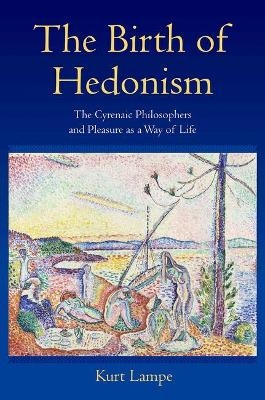
The Birth of Hedonism
Princeton University Press (Verlag)
978-0-691-16113-6 (ISBN)
Contrary to recent scholarship, the book shows that the Cyrenaics, despite giving primary value to discrete pleasurable experiences, accepted the dominant Greek philosophical belief that life-long happiness and the virtues that sustain it are the principal concerns of ethics. The book also offers the first in-depth effort to understand Theodorus's atheism and Hegesias's pessimism, both of which are extremely unusual in ancient Greek philosophy and which raise the interesting question of hedonism's relationship to pessimism and atheism. Finally, the book explores the "new Cyrenaicism" of the nineteenth-century writer and classicist Walter Pater, who drew out the enduring philosophical interest of Cyrenaic hedonism more than any other modern thinker.
Kurt Lampe is a lecturer in the Department of Classics and Ancient History at the University of Bristol.
Acknowledgments xi Abbreviations xiii Chapter 1 Introduction 1 1.1. A Cyrenaic Parable: The Choice of Pleasure 1 1.2. Methodology 3 1.3. Overview of the Book 8 1.4. A Note on Conventions 10 Chapter 2 Cyrene and the Cyrenaics: A Historical and Biographical Overview 12 2.1. Introduction 12 2.2. Fourth-Century Greek Philosophy 12 2.3. Cyrene and Cyrenaica 13 2.4. Aristippus 16 2.5. Mainstream Cyrenaicism 18 2.6. Hegesias 20 2.7. Anniceris 21 2.8. Theodorus 23 Chapter 3 Knowledge and Pleasure 26 3.1. Introduction 26 3.2. Aristippean Hedonism 27 3.3. Socrates' Influence on Aristippus's Hedonism 31 3.4. The Cyrenaic Theory of the Experiences 35 3.5. The Experiences as a Basis for Action 45 3.6. Cyrenaic Formulations of the End 52 Chapter 4 Virtue and Living Pleasantly 56 4.1. Introduction 56 4.2. Aristippus on Education, Virtue, and Happiness 57 4.3. Aristippean Presentism 64 4.4a. The Cyrenaics on Wealth, Justice, and Practical Wisdom 73 4.4b. The Cyrenaics on Speaking Well and Freedom from Negative Emotions 76 4.4c. The Cyrenaics on Education, Habituation, and Spiritual Exercises 80 4.4d. Interim Conclusion 81 4.5. Cyrenaic Presentism 83 4.6. Cyrenaic Formulations of the End 85 Chapter 5 Eudaimonism and Anti-Eudaimonism 92 5.1. Introduction 92 5.2. Personal Identity 94 5.3. Radical Subjectivism 96 5.4. Aprudentialism 97 Chapter 6 Personal and Political Relationships 101 6.1. Introduction 101 6.2. Aristippus 103 6.3. Cyrenaics and Courtesans 105 6.4. Mainstream Cyrenaics 108 6.5. Hegesias and Theodorus 110 6.6. Anniceris 115 Chapter 7 Hegesias's Pessimism 120 7.1. Introduction 120 7.2. Hegesiac "Targets" and the Hegesiac "End" 121 7.3. Ruthless Rationalism? 123 7.4. Indifference 128 7.5. Magnanimity and Philosophical Heroism 133 7.6. Autonomy and Cologne Papyrus 205 136 7.7. Pessimism and Heroism Revisited 142 Chapter 8 Theodorus's Innovations 147 8.1. Introduction 147 8.2. Ends, Intermediates, and Indifference 148 8.3. Theodorus the Pyrrhonist? 149 8.4. The Extemporaneity of Ethical Value and Judgment 153 8.5. "Atheism" and Other Polemics 159 8.6. Heroism 164 8.7. Conclusion 167 Chapter 9 The "New Cyrenaicism" of Walter Pater 168 9.1. Introduction 168 9.2. Walter Pater: From the The Renaissance to Marius the Epicurean 168 9.3. Unitemporal Pleasure 173 9.4. From Education to Morality 180 9.5. The Hedonic "Economy" 186 9.6. The Fear of Death 189 Chapter 10 Conclusion: The Birth of Hedonism 193 Appendix 1: The Sources 198 1.Introduction 198 2.Aristotle 198 3.Cicero 199 4.Clement of Alexandria 200 5.Diogenes Laertius (and Hesychius and the Suda) 202 6.Epiphanius 205 7.Eusebius and Aristocles 207 8.Plato 208 9.Xenophon 209 Appendix 2: Annicerean Interpolation in D.L. 2.86-93 211 1.Introduction 211 2.The Convergence between D.L. 2.86-89 and Clement Strom. 2.21.130.7-8 212 3.Formulations of the End and Demotion of Happiness 216 4.Anti-Epicurean Arguments 217 5.Conclusion 220 Notes 223 Bibliography 263 Index 275
| Zusatzinfo | 1 Maps |
|---|---|
| Verlagsort | New Jersey |
| Sprache | englisch |
| Maße | 152 x 235 mm |
| Gewicht | 567 g |
| Themenwelt | Geisteswissenschaften ► Philosophie ► Philosophie Altertum / Antike |
| ISBN-10 | 0-691-16113-5 / 0691161135 |
| ISBN-13 | 978-0-691-16113-6 / 9780691161136 |
| Zustand | Neuware |
| Haben Sie eine Frage zum Produkt? |
aus dem Bereich


